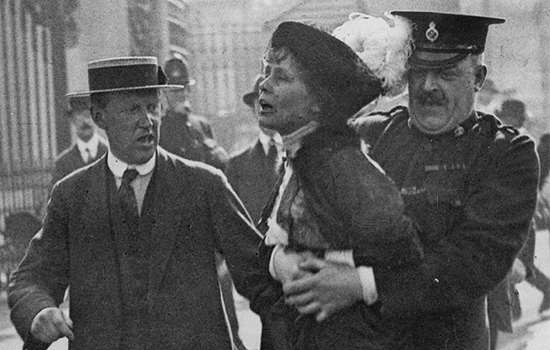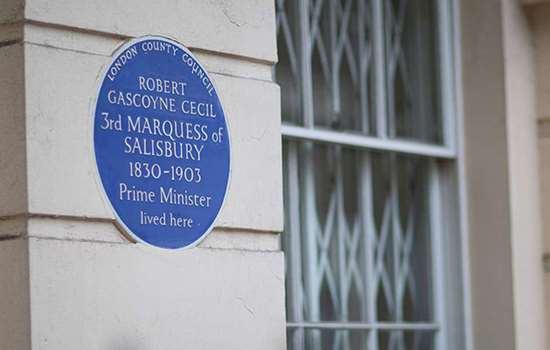ASTOR, Lady Nancy (1879-1964)
Plaque erected in 1987 by English Heritage at 4 St James's Square, St James's, London, SW1Y 6JU, City of Westminster
All images © English Heritage
Profession
Politician
Category
Politics and Administration
Inscription
NANCY ASTOR 1879-1964 First woman to sit in Parliament lived here
Material
Ceramic
The American politician and society hostess Nancy Astor was the first woman to sit in Parliament, holding her seat for over 25 years. She is remembered as a pioneer for women in politics. Number 4 St James’s Square was her London home between 1912 and 1946.
POLITICAL CAREER
Nancy Witcher Langhorne, born in Virginia, USA, travelled to England in 1904. Two years later, she married Waldorf Astor (1879–1952), a wealthy newspaper proprietor and the Member of Parliament for Plymouth. Raised to the peerage on the death of his father in 1919, Waldorf was obliged to give up his seat in the House of Commons and promoted Nancy as a candidate in the resulting by-election.
Although no woman had yet sat in the Commons, she won with 51% of the vote and remained the Conservative MP for Plymouth Sutton for over 25 years (1919–45). This was despite the fact that she had originally been regarded as a stop-gap candidate.
Ironically, Astor had never been part of the campaign to obtain votes for women, and was widely regarded as a political lightweight among those who were. However, her campaigning spirit and enthusiasm for politics were undeniable and she championed many causes on behalf of underprivileged women and children: she was, for example, a keen supporter and benefactor of the nursery schools of Margaret McMillan. A teetotaller, her most effective speeches were in support of legislation to ban the sale of alcohol to anyone under 18, a bill which was passed in 1923. She never held ministerial office.
THE CLIVEDEN SET
The Astors’ country house in Buckinghamshire – Cliveden – gave its name to the ‘Cliveden Set’, a shorthand term for a group of influential politicians who regarded Hitler as a bulwark against Communism, and supported the policy of appeasement, which sought to avoid conflict with Nazi Germany by accepting its territorial demands.
On the one occasion that he met him, Lord Astor took Hitler to task for the persecution of Jews. Nancy Astor was, however, prone to anti-Semitic comments. Antipathy to France, fed by her anti-Catholicism, also informed her pro-German views. Yet in 1940 she was one of the Conservative MPs who voted to secure Neville Chamberlain’s removal from office. Even so, her connections with the discredited policy of appeasement damaged her political standing.
Astor’s background – which informed her anti-drink campaigns – was Protestant, though she later converted to Christian Science. The political diarist ‘Chips’ Channon described her as ‘warmhearted, a whirlwind and a wit … but an unconscious snob and a hypocrite’.
ST JAMES’S SQUARE
In 1912 the Astors acquired 4 St James’s Square, the London addition to their portfolio of properties. Built in 1726–8 for the 1st Duke of Kent and now housing the Naval and Military Club, number 4 is the oldest building to survive in St James’s Square.
Bearing a Palladian façade of stock brick, the terraced mansion provided a glittering setting for entertaining, with its magnificent reception rooms and huge ballroom. At a time when such splendour was becoming rare, Lady Astor gave dinner parties for 50 people, threw a couple of balls a season for up to 600 guests, and held receptions for as many as 1,000.
Having been damaged by bombs and requisitioned during the Second World War, number 4 was finally sold in 1946. It was a moment that symbolised both the end of Nancy’s political career and the tradition of a great London house as a centre of political influence. The English Heritage plaque was unveiled in 1987 by the then Prime Minister, Margaret Thatcher, who praised Astor’s courage – from which she herself had taken heart – for going into ‘that totally male-dominated place’.
Further Reading
- Martin Pugh, ‘Nancy Astor (1879–1964)’, Oxford Dictionary of National Biography (Oxford, 2020) (access via UK public library card or subscription; accessed 26 August 2020)
- Alex May, ‘Cliveden Set (act. 1937–1939)’, Oxford Dictionary of National Biography (Oxford, 2020) (access via UK public library card or subscription; accessed 26 August 2020)
- Stephen Castle,‘U.K. Honors a Flawed Feminist Trailblazer, Nancy Astor’, The New York Times (December 2019) (accessed 26 August 2020)


